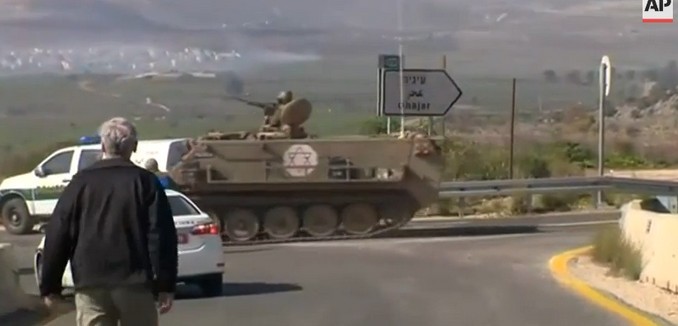Two Israeli soldiers were confirmed dead and seven wounded after terrorists in Lebanon fired an anti-tank missile that hit a military vehicle on the border with Israel, the IDF confirmed. Israel responded to the cross-border attack with artillery fire and a warning to the Iran-backed Hezbollah terror group, which claimed responsibility for the attack.
The dead soldiers have been identified as Captain Yohai Kalangel and Sergeant Dor Nini.
A UNIFIL peacekeeping soldier was killed during the ensuing exchange of fire.
Speaking at a ceremony in Sderot near the Israel-Gaza border, Prime Minister Benjamin Netanyahu issued a stern warning that any threat to Israeli security would be met with a strong response:
“To everyone who is trying to challenge us at the northern border, I recommend for them look what happened there, not far from the city of Sderot, in Gaza. Hamas took its hardest hit since its formation and the IDF is prepared to act strongly on all fronts.”
The attack came after more rockets were fired Tuesday night at Israel from Syria, prompting an Israeli Air Force retaliation against Syrian military targets shortly after midnight on January 28. It was the second day in a row that rockets were fired at Israel.
Iran- and Hezbollah-affiliated figures had vowed to retaliate for a January 18 strike on a Hezbollah convoy in Syria which has been widely attributed to Israel. Six Hezbollah operatives were killed in the strike, along with six Iranian Islamic Revolutionary Guards Corps (IRGC) operatives including a high-ranking general. Iran has not explained why it had a high-ranking military team so close to the Israeli border, but the general killed was said to be planning to set up a missile base in Syria near the border with Israel.
The IDF confirmed the latest overnight airstrike against Syria came minutes after reports of air sirens heard in the Israeli part of the Golan Heights warned of incoming rocket fire. The Jerusalem Post reported a statement from the military, which said, “The IDF views the Syrian regime as responsible for what occurs in its territory and will act at any time and in any way it sees fit to protect the citizens of Israel.”
Reuters reported:
Maj. Gen. (res) Israel Ziv, former head of the army’s Operations Directorate, explained in a conference call with journalists why Hezbollah chose the Mount Dov region for its retaliatory attack. “What happens in Shebaa stays in Shebaa,” he said. Ziv explained that due to the disputed nature of the area, Israel has in the past refrained from launching large-scale retaliations in Lebanon in response to Hezbollah actions there.
Ziv was speaking on a conference call hosted by The Israel Project. The Israel Project publishes The Tower.
The two rockets that exploded in the northern Golan Heights yesterday triggered air raid sirens and sent local residents, including visitors to the Mount Hermon ski site, fleeing for cover. The rockets exploded in open territory, and failed to cause injuries or damages.
According to the Post, the day before the rocket explosions in the Golan, Israeli Defense Minister Moshe Ya’alon warned that Iran was seeking to open a new front against Israel from the Syrian border:
“Iran seeks to attack Israel, whether from Lebanon with Hezbollah or from Gaza, with Hamas and Islamic Jihad, or whether it’s what we saw last Sunday – an Iranian arm that is beginning to develop, to open a front against us on the Golan Heights.”
[Photo: Associated Press / YouTube ]




